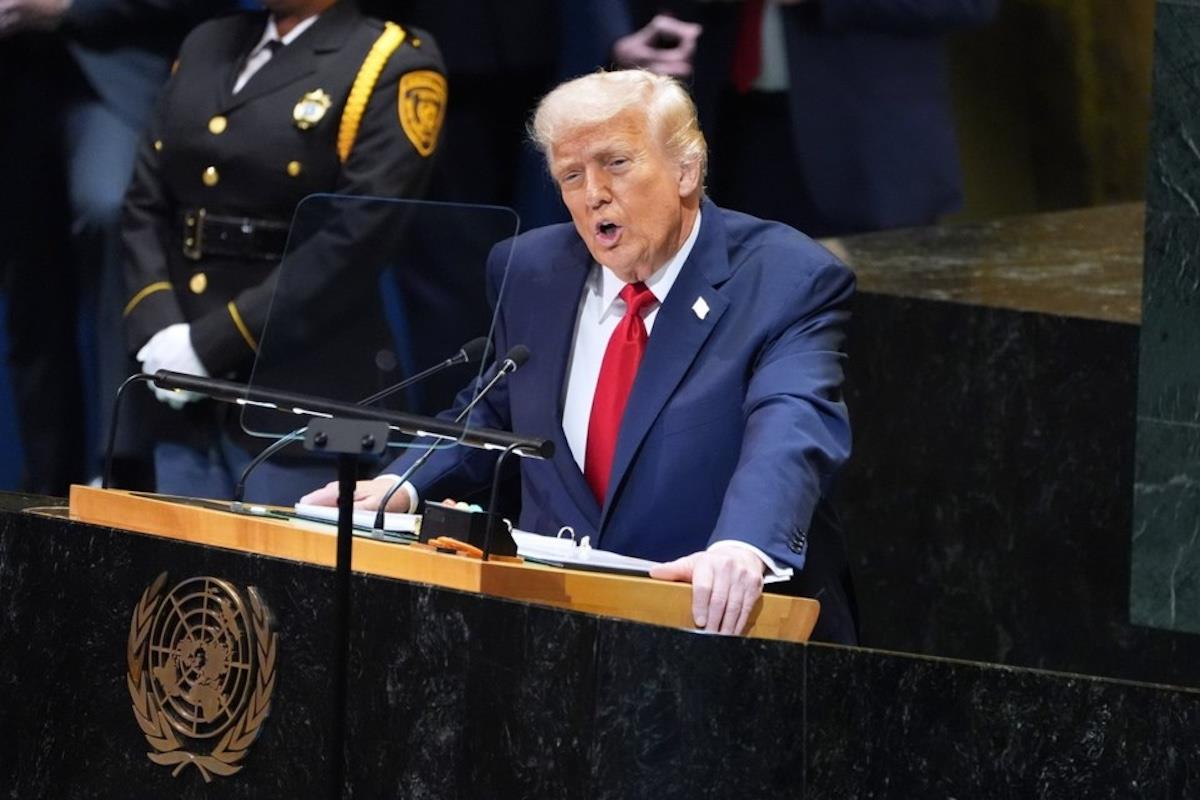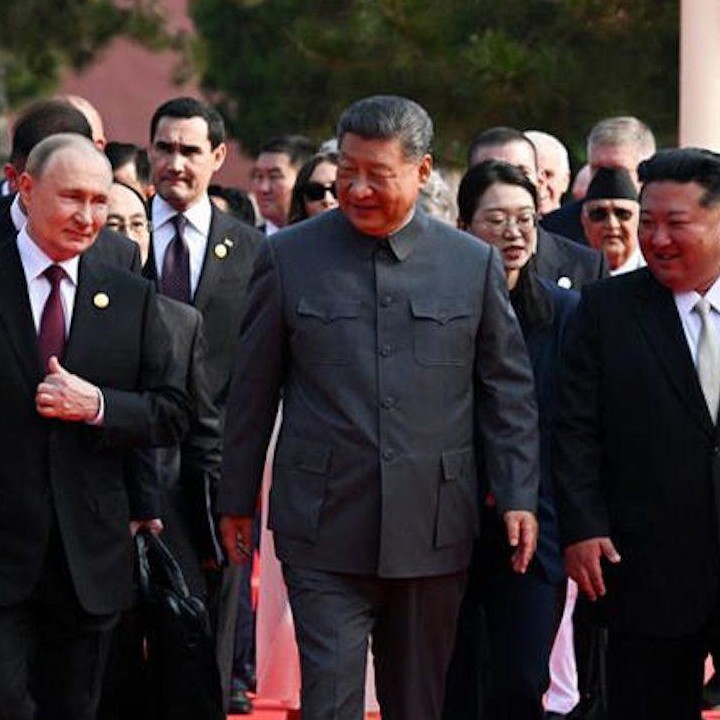Kim Jong Un's Strategic Gamble On A Post-Western Order
If one wonders why North Korea is withholding engagement with Washington and Seoul, the optics of Beijing's Victory Day military parade may hold the answer. Surrounded by Xi Jinping, Vladimir Putin, and more than two dozen leaders from Asia, Africa, and Latin America, Kim Jong Un appeared not as an isolated outlier but as a peer in a shifting world order.
His front-row presence signaled a decisive break from North Korea's decades-long pursuit of US recognition and the start of a calculated gamble on a post-Western order. Kim now seeks legitimacy and economic development not from Washington, but from an emerging international community outside US leadership.
Since the breakdown of the Trump-Kim talks in Hanoi in 2019, the space for renewed US-DPRK engagement has narrowed considerably. Even with pro-engagement administrations returning in both Washington and Seoul, Kim has signaled a deliberate strategy of distancing, by dismissing a personal outreach letter from Donald Trump and publicly rejecting overtures from South Korea 's new Lee Jae Myung administration.
Analysts often explain this posture in terms of two shifts:
-
Kim's policy recalibration after the failure of Trump-era diplomacy, when he appeared to abandon both the long-standing goal of normalization with the United States and inter-Korean policy; and
the opportunities opened by Russia's war in Ukraine, which left Moscow isolated and eager for partners, giving Pyongyang leverage to reduce its dependence on China.
While valid, these explanations do not capture why Kim is not simply raising the stakes with Washington and Seoul but, instead, is shutting the door on engagement altogether.
The fact is, Kim has not simply shifted policy – he has charted a new strategic course for North Korea, one in which Washington is no longer the protagonist.
Constant pursuit of independence and legitimacyPyongyang's foreign policy has always been driven by more than regime survival. Since its founding, North Korea has sought to assert sovereignty and independence – but also to secure international legitimacy and prestige and to escape the image of Korea as a“shrimp among whales” trapped between powerful neighbors.
The Kim dynasty has consistently sought opportunities to advance these goals, demonstrating a pragmatic willingness to shift alignments as the global balance of power evolved.
Latest stories
The right way to read Trump's UN speech West caught between a 'paper tiger' and a Russian bear

The Ganges River is drying up faster than ever
In the 1950s and '60s, Kim Il Sung exploited the growing rivalry between Beijing and Moscow to foster a polycentric international communist system in which Pyongyang could expand its influence. In the 1970s, he leveraged the 1948 Yugoslavia–USSR split by reaching out to Tito in an attempt to position North Korea as a leading voice in the Non-Aligned Movement (NAM). In the 1990s, when the Soviet collapse left Pyongyang isolated, Kim Il Sung calculated that recognition from the United States-the post-Cold War superpower-was the only way forward. Since then and for decades after Kim's death, normalization with Washington became a central pillar of North Korean strategy, carried forward by Kim Jong Il and Kim Jong Un.
That vision collapsed in Hanoi. There, Kim Jong Un confronted the reality that even under the most favorable conditions, US and North Korean goals were fundamentally irreconcilable. The breakdown of diplomacy with Trump meant more to Kim than simply losing a deal-it signaled the abandonment of the strategic vision that had guided North Korean foreign policy for decades. He now needed a new path forward.
A Moscow opening, a BRICS dreamIn line with traditional North Korean strategy, Kim Jong Un is seeking to achieve his goals by exploiting fractures in the great-power divide and recalibrating alliances in response to shifting global dynamics.
Pyongyang shares Beijing's view of today's geopolitical landscape not as“Cold War 2.0” but as the inevitable decline of Western dominance and the rise of multipolarity. Within this context, China and Russia's growing rift with the US has created an opening for North Korea to assert itself as an independent and influential actor in the emerging alternative international community.
However, Pyongyang adds its own vision of the emerging international community as fundamentally anti-imperialist. As Kim laid out in his 2024 policy speech to the Supreme People's Assembly, North Korea“should set the development of relations with socialist countries as its primary task” and“launch a courageous anti-imperialist joint action and joint struggle on an international scale.”
The war in Ukraine and renewed ties with Moscow mark the first step along this path. Just as Kim Il Sung once saw Tito as a bridge into the Non-Aligned Movement, Kim Jong Un may view Putin as a stepping stone toward broader international recognition.
In fact, their 2024 treaty pledged mutual support in joining international organizations, and Pyongyang's participation in BRICS sideline events signals a clear ambition to join the bloc.
For Pyongyang, BRICS offers more than symbolism . Membership would anchor North Korea in an alternative order that rejects US-led dominance and brings together rising powers such as China, India and Brazil.
Washington's role in Pyongyang's shiftUS foreign policy has played a paradoxical role in the development of Kim's new strategy.
Over the past decade, rather than pursuing a classic divide-and-rule strategy to exploit the many deep-seated frictions among its rivals, Washington has sought to cast China, Russia, Iran and North Korea as a single bloc – CRINK, a new“axis of evil” meant to rally allies against them.
Yet this combine-and-contain approach, designed to reinforce US leverage, has produced the opposite effect: America's adversaries are finding common cause in resisting US pressure, bridging their divides and expanding cooperation.
The primary beneficiary of this dynamic is North Korea. While the war in Ukraine provided Kim with short-term breathing space, the broader confrontation produced by Washington's Cold War strategy has opened the way for his long-term ambitions.
By casting Pyongyang as a prominent player in a wider anti-Western bloc, US rhetoric accelerates its integration into an international order in which North Korea can thrive without compromising on its status or regime security.
In this context, engagement in denuclearization talks with the United States looks not only unnecessary but counterproductive to Kim's goals. Kim has no incentive to return to the negotiating table.
Some had hoped that Donald Trump's return to the presidency might disrupt this trajectory, given that his personal diplomacy with Kim once appeared to sidestep entrenched Cold War logic. Yet his personal tweets during the parade lashed out not only at Beijing but also at Moscow and Pyongyang – while even alienating India through new trade tariffs and pointed remarks about its ties to China .
Instead of breaking the anti-Western bloc narrative, Trump inadvertently reinforced it.
Beijing's parade: A triumph leaving no hope for denuclearizationThe optics of China's Victory Day military parad embodied Kim's success. Twenty-six leaders from what was branded a new“international community” stood alongside Xi and Putin. Kim Jong Un was not at the margins but in the front row, projecting equality and prestige.

Sign up for one of our free newsletters
-
The Daily Report
Start your day right with Asia Times' top stories
AT Weekly Report
A weekly roundup of Asia Times' most-read stories
This was precisely the kind of international recognition Kim and his predecessor had sought for decades – finally achieved not through compromise with Washington but by rejecting it.
For 30 years, North Korea pursued autonomy and legitimacy by courting Washington. Now, Pyongyang is taking a different route: embedding itself in an emerging multipolar order that challenges the US-led rules-based system, where it can gain prestige, recognition and the prospect of integration into a rising alternative international community – without compromising regime security or its nuclear status.
In this new reality, diplomacy on terms set by Washington and Seoul is not just unnecessary for Kim Jong Un – it has become counterproductive. The costs of engagement – pressure to denuclearize, risk of appearing subordinate or undermining ties with Moscow and Beijing – outweigh any potential benefits.
In his September 21 speech to the Supreme People's Assembly, Kim turned the tables on both Trump and Lee. There will be no talk of denuclearization, no talk of reunification. The old formula of normalization through denuclearization is finished. Pyongyang no longer seeks Washington's stamp of approval. That moment has passed.
North Korea has turned the page – and diplomacy on the Korean Peninsula must follow, or fade.
Marialaura De Angelis (... ) is a James A. Kelly resident fellow at Pacific Forum and an affiliated researcher at the East-West Center. She also serves as a senior advisor to the NGO Track2Asia in Brussels.
Sign up here to comment on Asia Times stories Or Sign in to an existing accoun
Thank you for registering!
An account was already registered with this email. Please check your inbox for an authentication link.
-
Click to share on X (Opens in new window)
X
Click to share on LinkedIn (Opens in new window)
LinkedIn
Click to share on Facebook (Opens in new window)
Facebook
Click to share on WhatsApp (Opens in new window)
WhatsApp
Click to share on Reddit (Opens in new window)
Reddit
Click to email a link to a friend (Opens in new window)
Email
Click to print (Opens in new window)
Print

Legal Disclaimer:
MENAFN provides the
information “as is” without warranty of any kind. We do not accept
any responsibility or liability for the accuracy, content, images,
videos, licenses, completeness, legality, or reliability of the information
contained in this article. If you have any complaints or copyright
issues related to this article, kindly contact the provider above.
Most popular stories
Market Research

- Zebu Live 2025 Welcomes Coinbase, Solana, And Other Leaders Together For UK's Biggest Web3 Summit
- Yield Basis Nears Mainnet Launch As Curve DAO Votes On Crvusd Proposal
- Blueberry Launches A Bold New Brand Platform
- Stonehaven Circle Marks 13Th Anniversary With Hadrian Colwyn Leading Calvio Ailegacyx Innovation
- R0AR Launches Buyback Vault: Bringing 1R0R To R0AR Chain Unlocks New Incentives
- Moonbirds And Azuki IP Coming To Verse8 As AI-Native Game Platform Integrates With Story





















Comments
No comment